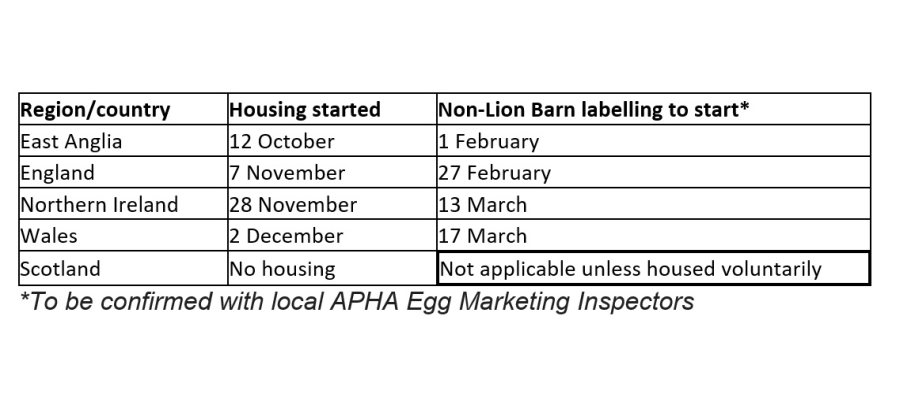
The government has introduced egg labelling changes for free range poultry that have had to be housed inside due to the ongoing bird flu crisis.
From today, eggs originating from free range flocks in the east of England - Norfolk, Suffolk and parts of Essex - will need to be labelled as barn eggs.
The concession will apply to the rest of England from 27 February, which is in line with egg marketing standards regulations.
The commencement date for the east of England marks the end of the 16-week grace period given after the introduction of a regional housing order, on 12 October 2022.
A subsequent England-wide mandatory housing order was issued on 7 November 2022 as a result of a growing number of avian influenza cases.
In recognition of the sector's heightened input costs and the impacts of bird flu, Defra said it would allow the same packaging concessions that were granted last year.

Where other options are not feasible, such as over-stickering or marketing eggs in “barn reared” egg boxes, industry will be allowed the use of direct print to pack or an affixed label on free-range boxes to communicate to consumers that the eggs have come from hens that are now barn reared.
The labelling will remain in place until the mandatory housing order is lifted, Defra confirmed.
It follows support for the poultry sector announced last October, allowing compensation to be paid to farmers from the outset of planned culling rather than at the end.
Over the last two years, the UK has faced its largest ever bird flu outbreak with over 300 cases confirmed since late October 2021, of which over 270 have been in England.
Announcing today's egg labelling changes, Farming Minister Mark Spencer said he hoped the concessions would help ease the burden the sector was facing.
“Farmers and poultry producers are facing real pressures as a result of this avian influenza outbreak," the Defra minister added.
“We are very mindful of the need to maintain consumer confidence in the free-range brand long-term and appreciate the continued cooperation from the sector as we battle this insidious disease “
What are the new requirements?
As required by the legislation, an indication of the farming method must continue to appear on the outer surface of packs containing the eggs in easily visible and clearly legible type.
Eggs must be stamped with the appropriate code to show that the farming method has changed from ‘free-range’ or 1UK to ‘barn’ production or 2UK. Eggs should not be stamped with two codes.
The egg industry must put in place one of the requirements for marketing eggs laid on or after the expiry of the 16-week derogation below.
These are, in order of preference:
1. Eggs are to be sold in “barn egg” boxes in order to clearly display the farming method of the eggs.
2. Over-stickering “free-range” boxes by placing a sticker over the “free-range” text in order to obscure or interrupt it leaving the correct farming method (“Barn Eggs”) easily visible and clearly legible to the consumer. The over-lay sticker must be of suitable material to be affixed to allow for good adhesion and to prevent any labels dislodging before sale to the final consumer.
3. The use of direct print to pack or an affixed label on free-range boxes where the words “Barn Eggs” are included in the ‘Best Before’ section for domestic sales. The words “Barn Eggs” should be easily visible and clearly legible.
Clear and transparent Point of Sale (POS) signage is also crucial to ensure consumers are not misled, and to avoid undermining consumer confidence in the free-range industry.
